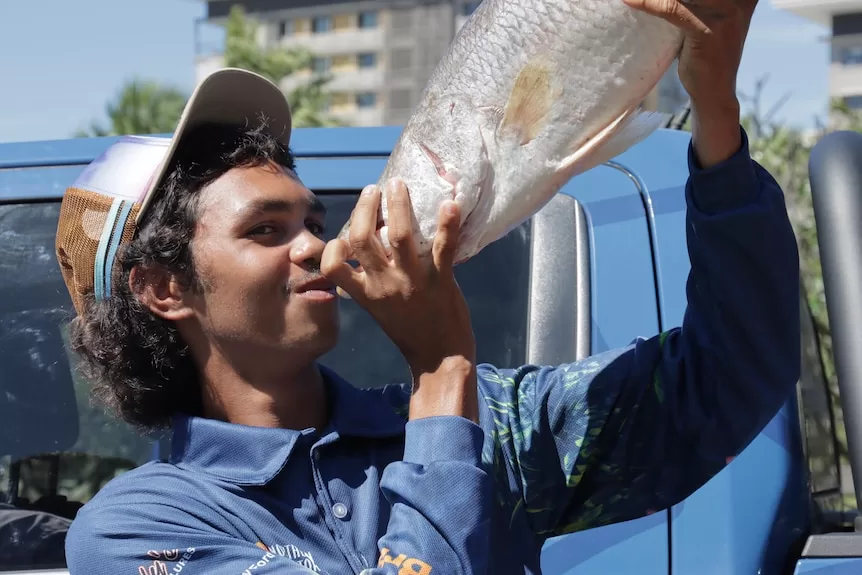He holds the white sign in his right hand, while his left pulls a buggy with two children in it.
Alongside him, his partner also holds a sign. Their children each have signs of their own.
In red letters his sign reads: REAL MEN RESPECT ALL WOMEN. Below it in black font: BE BETTER MY DUDES.
The family was among the thousands who walked in a rally demanding an end to gendered violence in Canberra earlier this week.
There has been no shortage of headlines about the event, ranging from allegations Prime Minister Anthony Albanese lied, to questions about his conduct after his comments left Sarah Williams, a 23-year-old Indigenous victim-survivor, in tears.
Too often these moments are reduced to black-and-white commentary, where one is framed as right and the other wrong.
We reach, as a society, for a clear definition because it makes it easier to process. Sitting with shades of grey is more complicated and, in many cases, uncomfortable.
For some, it’s much easier to dismiss Sarah Williams as someone who sought to block the heroic prime minister who had fronted up and wanted to speak. Williams = bad, Albanese = good.
Others saw the nation’s most powerful man steamroll a young women, opting to speak when others wanted him to listen. Williams = hero, Albanese = villain.
In reality, neither is a fair representation of the moment. Both can be true.
Not just a women’s issue
Humans are complicated. Albanese, like the man with the sign, fronted up and added his voice to the mostly female rally in Canberra.
Other men felt unable to. One rally attendee told the ABC she had been unable to convince her husband and son to come. They had decided it was a “women’s issue”.
Others may see themselves as modern men, but privately they pointed out violent crime “statistics are actually going down”.
There are the men who are quick to point out that men have been murdered this year too, without twigging that in most cases they’re also killed by men.
Whether deliberate or not, they’re dismissing this as an issue that shouldn’t be absorbing so much national attention, let alone prompting an emergency national cabinet meeting, as happened on Wednesday.
So far this year 28 women have lost their lives — 28 families who have lost a loved one to gendered violence. That’s 13 more women compared to the same time last year. In April alone, 11 women died allegedly at the hands of men.
The unspoken undercurrent of the week is that it’s clear there are a lot of men feeling uncomfortable about this conversation. That doesn’t make them bad men. It should be uncomfortable.
That women feel the need to text a friend to let them know they’re walking alone, or go to sleep doubting the safety of their bedroom window at night is uncomfortable. More than uncomfortable — unbearable — was the call 28 families received to learn their loved one had died.
Putting money on the table
Some may have criticised Albanese for mishandling the rally, dubbing him the bad guy, but he showed up, and has since committed close to $1 billion dollars to support people fleeing abusive partners.
The government has made permanent a trial that started under the Coalition in 2021. More than 45,000 Australians have accessed the $1,500 cash payment and $3,500 in goods and services to help them leave a violent partner.
But more than half of those applications weren’t approved, suggesting the scale of this problem is so much bigger than we might think.
Albanese has made clear the new funding isn’t enough, as some advocates have argued. He has vowed that the government will need to do more, as will many others well beyond federal politics.
For decades women have done the heavy lifting to try and address gendered violence.
But if any inroads are to be made, it’s going to require a coalition of men who not just acknowledge the problem but create a culture that calls out sexist and misogynistic behaviour that so often serves as a precursor to violence.
Loading…
Image put a human face on court ruling
The start of the week also saw WA Police take the unorthodox approach of releasing an unedited image of a bloodied and bruised 73-year-old woman.
They did so, they said, “to convey to the public the violent and unprovoked nature” of an alleged crime committed against an elderly woman.
In doing so, WA authorities unwittingly made Ninette Simons the human face of the government’s ongoing handling of a landmark High Court ruling.
Among those police have charged with her alleged attack is a member of the so-called NZYQ cohort, the almost 150 people released from indefinite immigration detention.
It wasn’t the only NZYQ matter the government had to contend with this week.
Federal police this week confirmed a Sudanese-born man, a Burundi-born man and an Afghanistan-born man, all members of the NZYQ cohort, were all charged with alleged visa breaches and now face the prospect of jail time.
Try as the government might to speak about the budget, which is now within a fortnight, the charges have again distracted the government from its efforts to tackle inflation in voters’ minds.
Rays of light in the darkest of weeks
If it wasn’t apparent by now, it’s been a rough week of news for people to contend with, not to mention the airline Bonza going belly up.
There was, however, at least one piece of good news. It’s the thing of dreams, a made-for-Hollywood script.
A young man, in this case aged 19, from a big rural family battling inflation. He goes out for an early morning fish with his mates and sister only to reel in a million-dollar bounty.
You only need one glimpse of Keegan Payne’s (now literal) million-dollar smile to be reminded there are rays of light that exist even in the darkest of news weeks.
